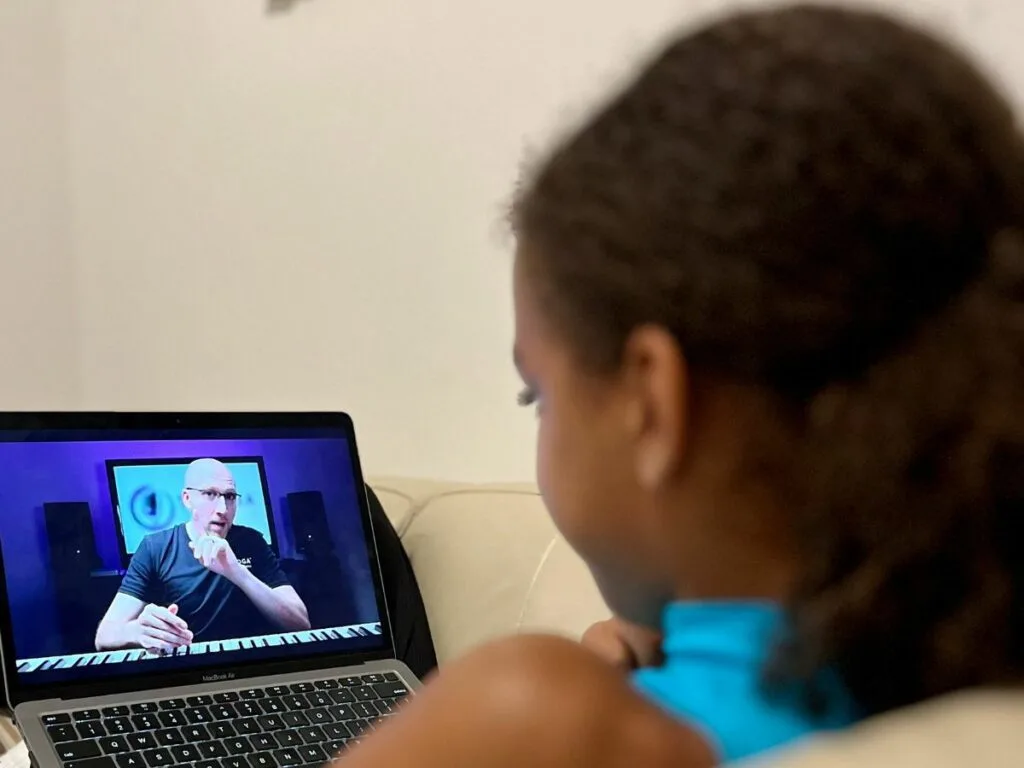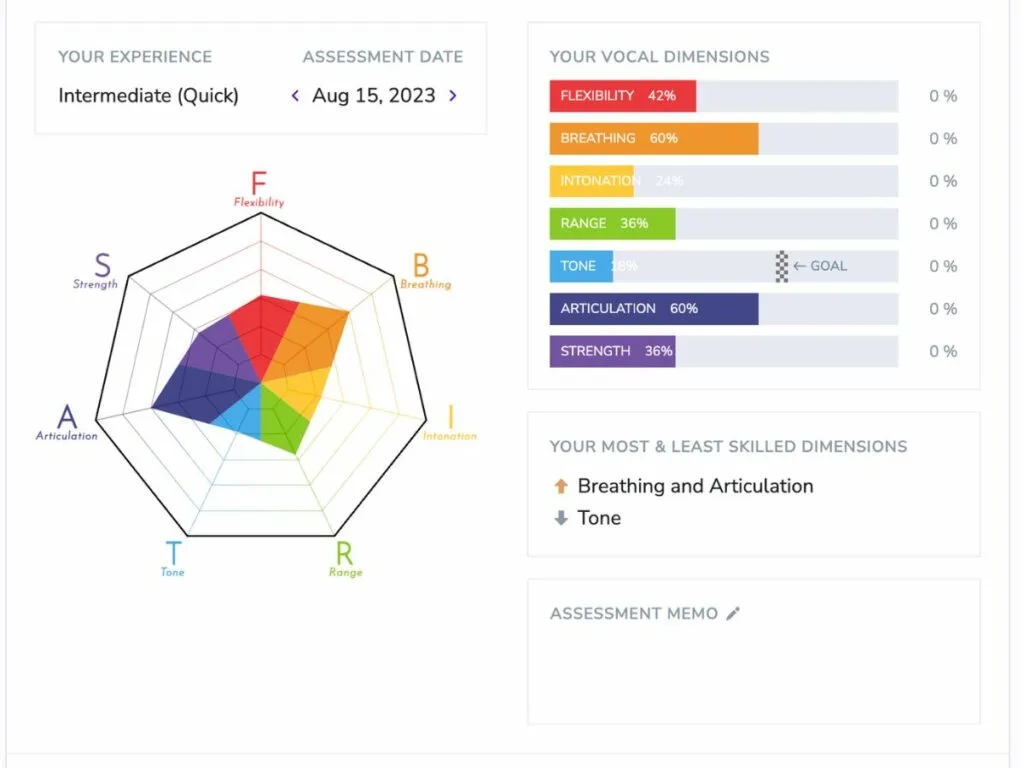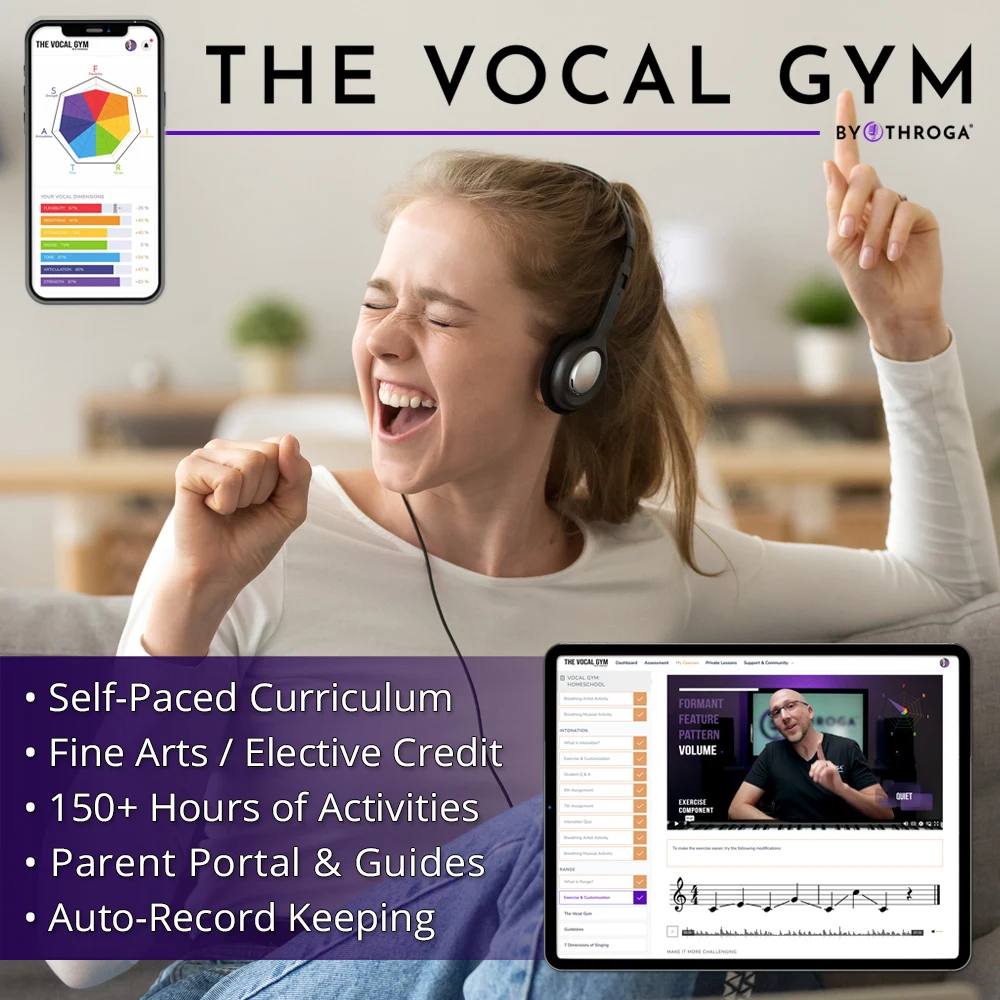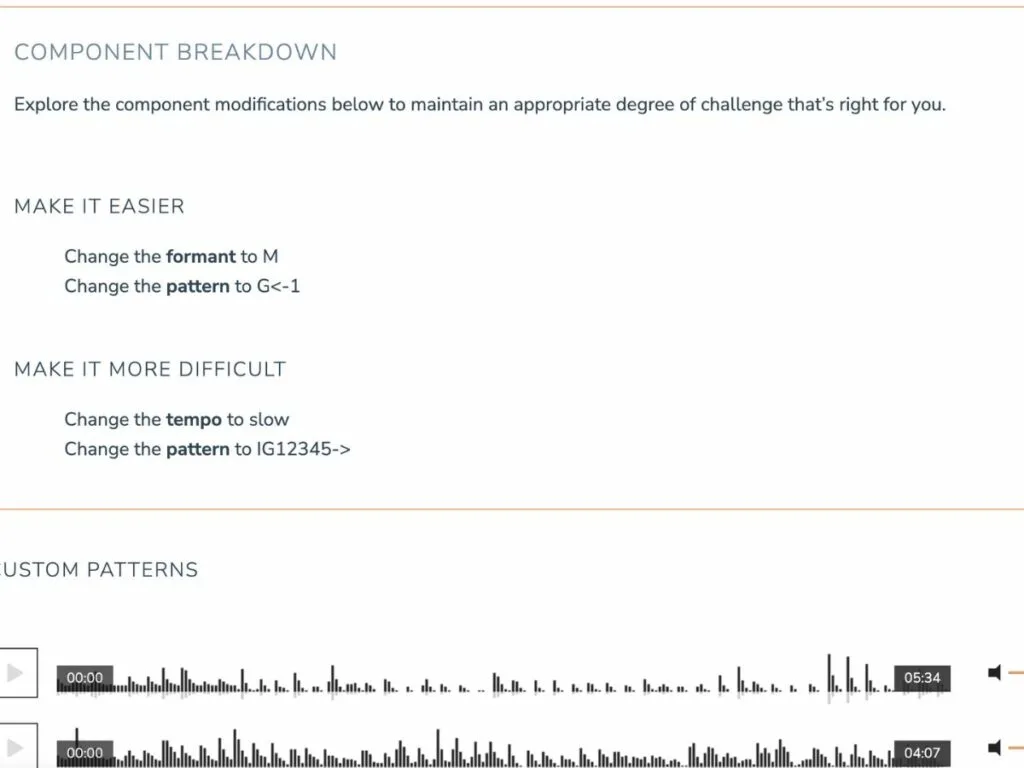Online singing lessons are a powerful way to develop solid vocal techniques and learn the skills needed to become a better singer. The Vocal Gym by Throga uses patented methods to teach teens and adults the essential guidelines for singing as well as the seven dimensions of the voice. Read our full review to find out how Throga-certified instructors help students access their hidden vocal potential.

I received access to The Vocal Gym by Throga for review purposes and I was compensated for my time. All opinions are my own and I am not required to post a positive review.
Why Our Family Prioritizes Arts Education
Growing up, I loved to sing. I joined the school choir yearly, auditioned for musicals, and belted out Beyoncé tunes twenty hours a day. Unfortunately for those around me, my vocal technique was less than amazing. It hadn’t occurred to me—or, I suppose, to my parents—that singing skills were something one could learn. Like many people, I assumed singing was something you could either do well or not. That didn’t stop me from loving to sing, but I became more self-conscious over the years about singing in public.
After watching a high school musical a month before graduation, I decided I would try to learn how to sing. I moved to the other side of the country for university and as soon as I got settled there, I started researching voice teachers. The Internet was still shiny and new, so online lessons weren’t an option, but I found a local vocal teacher willing to take me on with nary an audition.
While I didn’t become a fantastic singer overnight, I learned vocal exercises and techniques that helped me become a better singer. By the end of the school year, I was able to sing two pieces in a recital. I continued with my vocal lessons throughout university and for many years after.
So, when my teenage daughters were younger and began showing an interest in musical theater, I was determined that they wouldn’t have to wait as long as I did to develop proper technique. I put them in singing lessons as soon as I could and we have been involved in musicals for almost ten years now.
But along the way, we all had to give up on our singing lessons for various reasons—the cost, our lack of available time for practicing, the distance to the teacher’s studio, the addition of multiple kids to our family, and of course, the pandemic, all made it hard for us to continue. We all love singing and want to keep developing our vocal skills, but we haven’t figured out how to make it work.
That’s why I jumped at the opportunity to try out an online singing course this summer.
Online Voice Lessons Make Music Education Accessible
While there are clear benefits of working with an in-person voice teacher, such as receiving real-time personalized feedback on your technique, there are also many barriers to enrolling in this type of lesson. As mentioned above, cost, time, and distance can all get in the way of students pursuing their love of singing with in-person lessons.
Online singing courses remove some of these barriers. With online learning, students get unlimited access to their lessons. They can repeat individual lessons as many times as necessary to master them. They can practice in the comfort of their own home. They typically also get access to a library of videos so they can challenge themselves to conquer both beginner and advanced techniques.

Online voice lessons are frequently more affordable than in-person lessons, especially if you have multiple family members taking voice lessons. And, with today’s music learning apps offering online courses taught by a wide variety of professional singers, each with extensive experience and their own unique teaching style, students are more likely to find the teacher or teachers who resonate best with them, leading to an overall positive experience.
The Vocal Gym’s Online Singing Lessons for Homeschoolers
Throga is a vocal technique founded by one of the world’s leading online vocal coaches, Richard Fink IV. With over twenty years of teaching experience, Richard is an internationally recognized voice coach.
Throga (a portmanteau of throat and yoga) uses a scientific approach to build healthy, strong, and well-balanced singing skills. It is the only vocal technique to be awarded a U.S. patent and is used by singers, speakers, actors, and educators in over a hundred countries.
Available at a variety of levels, The Vocal Gym by Throga is a comprehensive singing program. Each version of the online singing course starts with an assessment that determines the student’s baseline vocal profile. It targets various challenges singers face such as:
- Running out of air
- Not being able to change between registers
- Voice cracks
- Controlling sound quality
As an experienced vocal student, I was curious to try The Vocal Gym by Throga for myself, in addition to signing my kids up. (Why should they have all the fun, right?) I started by completing the vocal profile assessment.

The questions I was asked assumed a certain amount of knowledge and experience about singing, though students can select “I don’t know” if any of the terms are unfamiliar to them.
At the end of the assessment, students watch a short video and then receive their unique voice profile. The Vocal Gym program breaks your voice down into seven dimensions and matches you with specific exercises designed to build on your existing strengths and weaknesses.
Earn Fine Arts Credits from the Comfort of Your Own Home
When kids reach the final years of high school, their time becomes so valuable. Each course they take eats up a large chunk of their time and they also want to make space for extracurriculars, chores, part-time jobs, and seeing friends. They get pickier about what they want to commit themselves to and usually want each course they take to count for something on their transcripts as they’re preparing for college or university.
Throga has set up a homeschool-specific edition of its online courses to help homeschoolers meet this need. When students take Throga’s Vocal Gym for Homeschool program, they develop their singing ability while also getting full credits for a fine arts course. This is a great way to check off high school graduation requirements while pursuing something they love.
Unlike in-person private lessons, which may not be set up to help homeschoolers earn credits, The Vocal Gym for Homeschool makes it easy for parents to manage their kids’ online courses. Features of the parent portal homeschool toolbox include:
- Automated records and timekeeping
- 150+ Carnegie credit hours per year, recognized across all fifty U.S. states
- Self-paced and graded curriculum
- Parent portal and progress reports that allow you to monitor progress, practice time, and work completed
Designed for students twelve and over (including adults!) the course is suitable for all skill levels and doesn’t require students to read music or have any previous knowledge of music theory or techniques.
The Vocal Gym is not an overnight solution to becoming a better singer. Like any vocal training lessons, the best online singing lessons require consistent practice if you want to see improvement. Students will focus on specific areas of their voice independently while doing customized vocal exercises and put all their newfound skills and techniques together as they advance through the program.
Looking for music education for your preschool-aged children? Check out this program.
What I Love About The Vocal Gym’s Homeschool Singing Program
Over the past twenty years, I’ve worked with half a dozen singing coaches and read several books about singing. Each one brought something different to the experience. While one music teacher may focus more on breathing techniques and mouth positioning, another may put more emphasis on embodying and conveying the emotion of a piece of music. All of these aspects are important but different teachers’ teaching styles will click more with different students and at different times.

Ultimately, though, some music lessons are simply more effective than others. Here are a few things I love about The Vocal Gym that I think make it stand out among other online classes and even many in-personal vocal coaches.
Thoroughness
The idea behind The Vocal Gym is that singers, like athletes, need to work out and train consistently to perform at their highest levels. They must understand their body (their instrument) deeply and know what makes it tick, what its strengths and weaknesses are, and how to exercise it for maximum results.
In that vein, the teachers break concepts down as a trainer would for an athlete, helping students identify and strengthen each individual aspect of their singing voice.
Rather than jump immediately into vocal exercises, The Vocal Gym introduces guidelines for singing and the seven dimensions of singing so young singers learn the basis of technique in a scientific way instead of haphazardly.
Right off the bat, The Vocal Gym starts by having physiotherapist Jim Bostock, who specializes in helping singers release muscle tension that constricts their vocal ranges, explain how the voice works. He discusses the cycle of phonation and the actions that our various body parts must take in order to produce sound.
Next, singer and professional vocal coach Cesar de la Rosa goes into the brain patterns and mindsets involved in the processes of practicing and performing. He also touches on physical health and why it’s important for singers to take care of their bodies.
Some of the helpful features of The Vocal Gym include:
- Assignments and quizzes to reinforce the learning process
- A picture glossary
- Live lesson events
- A vocal journal
- An online community to discuss lessons and share feedback with
- A certificate of completion
I love that The Vocal Gym coaches aren’t just concerned with developing good singers. They strive to create well-rounded, knowledgeable vocalists who have a firm foundation that will allow them to unlock their full musical potential.
Interesting Lessons
Even students who love singing can get bored in their singing lessons if we don’t switch things up on a regular basis. Most kids need new activities and challenges to sustain their interest in an academic program. Autonomy in project choices is also a good thing and the best online singing course will offer a range of interesting assignments for students to work on.
The homework assignments in The Vocal Gym are suitable for absolute beginners and experienced singers alike and are actually quite enjoyable. In the first unit, for example, students are tasked with listening to an entire album from one artist straight through (remember when that was the primary way we consumed music?) and providing their written feedback on it.
Artist selections for this project come from a variety of popular music genres and include Amy Grant, Patsy Cline, Frank Sinatra, Eric Clapton, and Alicia Keys. Students are encouraged to listen to an artist from a genre they are less familiar with and to pay attention to the qualities of the singer’s vocal style and delivery that they like and dislike.
Other assignments include watching musicals, operas, and musical documentaries. All activities are optional but add up to achieve the hours needed for receiving high school credit for the course. Students work through the assignments—and all of the lessons—at their own pace.
As a side note, if you end up using this program with your kids, I noticed that if you click Mark Complete on the assignments before clicking Submit, your written response will be deleted without warning. As always, it’s a good idea to write written responses to online assignments in a separate program like Google Docs or Apple Notes and copy and paste them over to the submission field rather than typing them directly into the program. We’ve lost far too much work to glitchy form fields (in general, not in this program specifically) to take chances like these anymore!
Personalized, Interactive Music Education
Once students have made some progress in The Vocal Gym and familiarized themselves with the guidelines and the seven dimensions, they get to begin their vocalization techniques. These take place within The Vocal Gym as well as in the Beyond the Gym training room.
For each of the seven vocal dimensions, there are numerous vocalization exercises. Each exercise has multiple customization options resulting in over a hundred thousand vocal exercise combinations. Students will learn how to make the exercises easier or more challenging depending on their needs as they progress.

They also have access to downloadable MP3s so they can take their exercises with them anywhere. Using the Pattern Vault, they can build custom exercises or further modify the exercises featured in the course, expanding their training repertoire even more.
The exercises are taught by founder Richard Fink IV, who explains both the exercises and their purposes in great detail. He really hones in on why and how to do each vocal drill for maximum efficacy. Although I have years of experience with singing lessons, I found that even just a few hours in Beyond the Gym gave me new insight into the exercises I’ve been doing all along. (This revelation is not unique to me. Professional singers such as Liz Longley have also found Richard’s explanations of basic techniques to be eye-opening).
Want to learn to play piano? Check out our top picks for piano apps for adults.
The Vocal Gym Hits the High Notes
Readers, I have to be honest—I am so excited about this program. Learning to sing well has been a long-time goal for me and my children and private singing lessons are not always feasible. With The Vocal Gym and the Beyond the Gym training exercises, I feel like we’re not even at a disadvantage. The depth of the lessons and the quality of the exercises make music education more accessible and offer a virtual experience that compares well–perhaps even exceeds–traditional vocal coaching.
The homeschool edition of The Vocal Gym can be purchased for $189 for a half-year subscription or $349 for a full-year subscription. Sibling and homeschool coop discounts are available.
If your teen is looking for a fine arts credit and is ready to give online singing lessons a try, I highly recommend checking out The Vocal Gym by Throga. Its affordability, accessibility, thoroughness, and rigor make it a fantastic alternative to other musical training programs and I believe students will see tangible improvement using this course.

Sophie Agbonkhese is a writer, homeschooling mother of four, and a recovering overachiever (who occasionally relapses). She is the founder of My Cup Runs Over, a site dedicated to helping busy women simplify and enrich their lives. When she’s not writing or debugging websites, Sophie spends her time reading, dancing, bullet journaling, reading, gardening, listening to audiobooks, and striving fruitlessly to have a clean house for at least five minutes.

